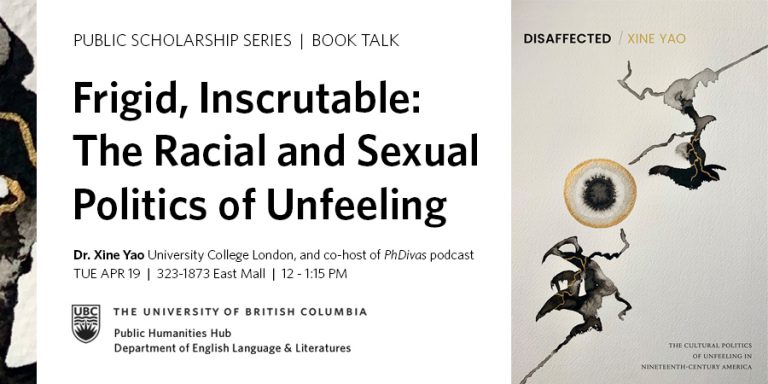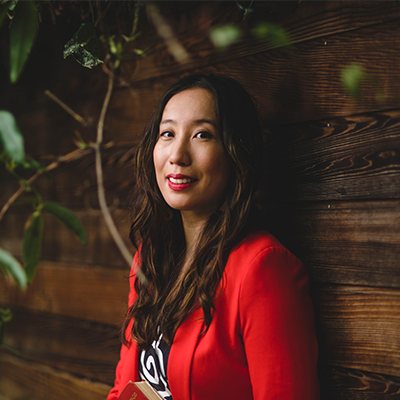
In this talk, Dr. Xine Yao will discuss their new book Disaffected: The Cultural Politics of Unfeeling in Nineteenth-Century America. A few book copies will be available for purchase onsite. Lunch will be provided. You may attend this event via Zoom (please register for the link).
This event is co-hosted with the UBC Department of English Language and Literatures.
Tuesday, April 19, 2022
12:00 – 1:15 PM (Pacific Time)
Buchanan Tower 323 (or online)
Speaker Bio
 Dr. Xine Yao is Lecturer in American Literature to 1900 as well as co-director of the queer studies network qUCL at University College London. Their first book is Disaffected: The Cultural Politics of Unfeeling in Nineteenth-Century America which has won Duke University Press’s Scholars of Color First Book Award (Duke UP 2021). Her honours include the American Studies Association’s Yasuo Sakakibara Essay Prize and their research has been supported by grants from the Social Sciences and Humanities Research Council of Canada. She is a BBC Radio 3/AHRC New Generation Thinker and the co-host of PhDivas Podcast.
Dr. Xine Yao is Lecturer in American Literature to 1900 as well as co-director of the queer studies network qUCL at University College London. Their first book is Disaffected: The Cultural Politics of Unfeeling in Nineteenth-Century America which has won Duke University Press’s Scholars of Color First Book Award (Duke UP 2021). Her honours include the American Studies Association’s Yasuo Sakakibara Essay Prize and their research has been supported by grants from the Social Sciences and Humanities Research Council of Canada. She is a BBC Radio 3/AHRC New Generation Thinker and the co-host of PhDivas Podcast.
About the Book
In Disaffected Xine Yao explores the racial and sexual politics of unfeeling—affects that are not recognized as feeling—as a means of survival and refusal in nineteenth-century America. She positions unfeeling beyond sentimentalism’s paradigm of universal feeling. Yao traces how works by Herman Melville, Martin R. Delany, Elizabeth Stuart Phelps, Frances Ellen Watkins Harper, and Sui Sin Far engaged major sociopolitical issues in ways that resisted the weaponization of white sentimentalism against the lives of people of color. Exploring variously pathologized, racialized, queer, and gendered affective modes like unsympathetic Blackness, queer female frigidity, and Oriental inscrutability, these authors departed from the values that undergird the politics of recognition and the liberal project of inclusion. By theorizing feeling otherwise as an antisocial affect, form of dissent, and mode of care, Yao suggests that unfeeling can serve as a contemporary political strategy for people of color to survive in the face of continuing racism and white fragility.